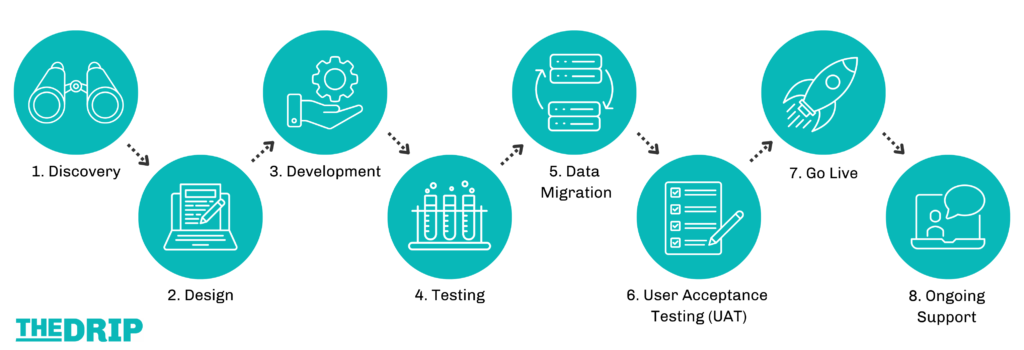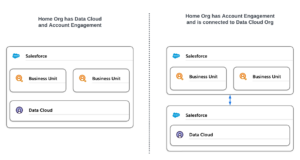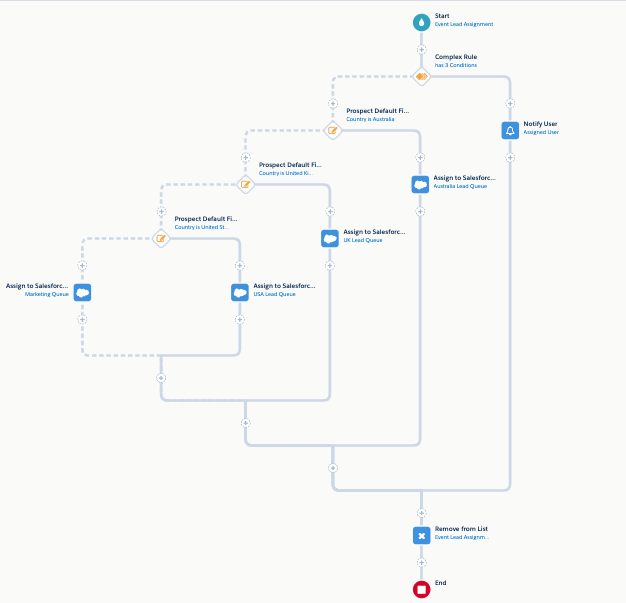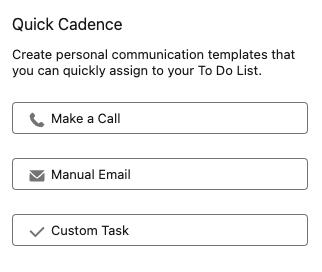Salesforce Marketing Cloud Implementations: What’s the Consultant’s Role?
- January 31, 2023
- Pardot Admin, Salesforce Ben | The Drip

Salesforce Marketing Cloud implementations involve setting up a new Marketing Cloud account, or making a specific enhancement to an existing account. There are specific requirements that are set out at the start of the implementation, and the delivery team takes those through to a successful ‘go live’.
Enter the Marketing Cloud consultant – the key player in the project delivery team. These professionals implement and optimize Marketing Cloud in an effective and scalable way. They possess a unique combination of technical skills and behavioral skills to execute their role. On one side, they possess Marketing Cloud product suite expertise, and on the other side, are equipped with communication skills and emotional intelligence to handle client needs.
Marketing Cloud implementations aren’t a ‘hands-off’ experience for your organization; involvement from various people in your organization (‘stakeholders’) is necessary to feed into a successful delivery. The objective of this guide is to bring a mutual understanding between consultants and your client-side team. We’ll outline the project responsibilities on both sides, so that you can set the correct expectations, and prepare sufficiently for the project lifecycle.
Marketing Cloud Projects
There are broadly two types of Marketing Cloud project engagements: implementation and managed services.
Implementation involves setting up a new Marketing Cloud account, or making a specific enhancement to an existing account. The main point is that there are specific requirements that are set out at the start of the implementation, and the delivery team of consultants, etc. implement according to those set requirements, taking it through to ‘go live’.
Managed services are offered by consultancies as a sub-part to the implementation projects, or as a standalone service. Services are sold in blocks of time (i.e. a set number of hours) and can be ‘spent’ making enhancements, solving bugs, or tackling minor new requests (that don’t warrant a full implementation lifecycle).
Marketing Cloud Implementation Stages
A Marketing Cloud implementation project is typically broken down into eight stages, following the pre-sales phase (once the prospective client becomes a paying client).

- Discovery: This phase is dedicated to understanding the business users’ needs using various techniques with stakeholders, e.g. campaign whiteboarding, focus groups, observation. The aim is to have documentation, such as functional requirement documents, process diagrams, etc.
- Design: Determining how the requirements will be met using the tools and technology.
- Development: Make the requirements a reality by building with the tools and technology available, e.g. campaigns are built in Journey Builder along with any required automation and integrations.
- Testing: The functionality that has been developed needs testing to ensure everything works as expected. The journey automation and integrations can be tested as a ‘unit’, i.e. self-contained tests run by the team that developed them. This should then be extended to end-to-end testing – the automations/integrations alongside their inputs and outputs. Also, emails should be tested on various browsers and devices.
- Data Migration (if applicable): For a new SFMC implementation, the marketing database needs to be migrated from the old systems. This stage is trickier than one may think, as the terminology and the way that data is stored is likely different from one system to another.
- User Acceptance Testing (UAT): Business users who provided the requirements, such as marketing teams, test the system in line with how they expect to use it. Test cases are checked against the agreed-upon requirements so that, ultimately, the system passes (or fails). The test cases could involve running the journeys, automation, and SFTP exports with sample data.
- Go Live: This marks when the features implemented are moved into the ‘live’ Salesforce environment (that Salesforce users utilize). Now that the implementation is ‘handed-over’, the marketing team can use the new functionality in their day-to-day Marketing Cloud operations.
- Ongoing Support: This is necessary to resolve any post-’go live’ bugs (errors) or user adoption teething issues. There also could be the opportunity to enhance the implementation, such as adding more journeys or extending segmentation methods.
Marketing Cloud Project Stakeholders
As mentioned, Marketing Cloud implementations aren’t a ‘hands-off’ experience for your organization – involvement from various people in your organization (stakeholders) is necessary to feed into a successful delivery. Stakeholders are the people in your organization (or customer/partner organizations, investors, government agencies) who have an interest in the project’s outcome.
These are the stakeholders in a Marketing Cloud project:
- Marketing Cloud Users: Typically the marketing team, these stakeholders use SFMC in their day to day roles.
- Leadership Team: Stakeholders who ‘sit’ higher up the org hierarchy and are related to the business teams. Leadership members make big decisions, and give cross-functional credibility to the project.
- The IT Team: This team will be involved when implementing features such as adding new channels, creating a custom activity in Journey Builder, integrations with external systems, or data migration.
- Business Stakeholders: Devise the marketing strategy of the company. This team may be the Marketing Cloud users, or include the wider organization. The Sales team is a good example – they engage with the customer directly, especially during the qualification, needs analysis, proposal, and negotiation stages.
- Project Managers/Product Managers: The Product Manager could, on some occasions, be the Project Manager on the client-side. This role is to ensure the project is running on time, to anticipate and mitigate roadblocks, and to update everyone on the project’s progress. The Product Manager not only provides the requirements, but also determines the prioritization, and gives guidance on items in the backlog.
Your organization may seek support from Salesforce Partners (SIs). These organizations hire Marketing Cloud experts who come with ample experience working on various use cases, for different client organizations. You could also find this expertise at agencies, or independent consultants who work on a freelance basis.
Regardless of who their employer is, Marketing Cloud consultants are the people who can mold themselves according to the requirements of the project (and/or client). You can find them involved at any stage of a project – even before the agreement is signed (pre-sales). Plus, Marketing Cloud consultants interact with both internal and external stakeholders during the project lifecycle.
The Consultant’s Role and Responsibilities
The Marketing Cloud consultant’s role may differ between projects To understand what can generally be expected of a Marketing Cloud consultant, this section provides some guidelines.

Pre-Sales Stage
Before the client ‘signs on the dotted line’, there’s a period of time that entails discovery, analysis, and prioritization (Note: Where there are external consultants involved in the agreement, there will also be negotiation over scope and the cost of delivering that scope.)
Providing Possible Solutions:
During initial discovery calls with the client, the consultant will ask questions to understand the current situation and the requirements for the new solution. They could assist by providing possible solutions, but will be cautious while minimal documentation exists.
Explain the Platform’s Features and Recommended Licenses:
Especially for SFMC, the consultant needs to explain the breadth of the SFMC platform to the client, and how it can bring ROI. Sometimes consultants also need to work out the license types that the client needs. This is called a ‘bill of material’ which defines all the products or SKUs and their price.
Presenting the Project Proposal:
Prepare the proposal presentation deck, or complete the request for purchase (RFPs) requested by the client alongside other team members (for example, where there are requests beyond SFMC).
Implementation Stage
Once the client agrees to the project scope, timeline, and cost, they will sign the statement of work (SoW), which details what will be delivered. Now is the time to build the solution.
Conducting Discovery Workshops:
Discovery workshops iron out the project requirements, adding more detail to what was discussed during the pre-sales stage. The consultant is supposed to drive the workshop for the client stakeholders. The consultant uses various methods such as questionnaires, requirements documents, whiteboarding, process diagrams, and RACI matrices to document the requirements.
Documenting Requirements, Gaining Feedback, Signoff:
Document the exact details of the project within multiple types of documentation. These then get approved by the respective stakeholders, incorporating any feedback given.
Solution Design:
The design covers the aspects of how SFMC will be tailored to the organization – the inputs (how data is ingested from external systems), processes (data segmentation, campaign plans), and outputs (data export to external systems for reporting).
Participating in Scrum Calls:
Agile seems to have become the default way to organize project tasks. Consultants participate in scrum calls which update all implementation team members on the project progress daily.

Working with External Teams:
If there is integration involved in the solution, consultants will initiate a discussion on the details of the integrations with the external team. For example, if the project involves an eCommerce integration, then the consultant must ensure that the data points, data format, and frequency of data is agreed and documented.
Resolving Queries:
Ensure that the requirements are clear to internal team members so that they can be empowered to maintain the solution after the project is completed.
Conducting User Acceptance Testing (UAT):
Consultants produce (or assist in producing) test scenarios for users. For example, the welcome campaign should be designed and tested by the marketing teams.
Training and Enablement:
Regardless of whether SFMC is new to the marketing team or not, the consultant is expected to train the internal team on the platform and produce documentation to aid the training.
Share Knowledge and Best Practices:
Consultants also share best practices in relation to the products/features involved in the project. Also, SFMC releases happen three times a year, where new features are added to enhance SFMC. The consultant should advocate that the internal teams are aware of these updates.
Managed Services/’Post-’Go Live’ Support
Depending on the statement of work (SoW), managed services could be offered by consultancies as a sub-part to the implementation projects, or as a standalone service.
Addressing Critical Issues:
Regardless of the managed services agreement, the consultant is expected to address any critical issues from the client, related to what they’ve implemented. The consultant is responsible for what they’ve built, and should handle requests tactfully by explaining what the issue is, what caused it, and ensuring the client is confident in their resolution.
The Client’s Responsibilities
Now that we’ve discussed the consultant’s responsibilities, it’s time to turn the focus onto the role that your company plays. What is expected from the organization during Marketing Cloud implementations?

Provide Requirements:
Provide information on what the business requires from the project. Withholding information is not helpful – in fact, it’s detrimental to both sides! Ensure that the consultant has captured your requirements, and ensure you sign-off before the next stage of the project goes underway.
Approve Documentation:
The documentation that the consultant provides will serve as the baseline for the project going forward. Your authority is required on the project documentation.
Attend Project Meetings:
Attend project meetings in order to provide feedback and/or steer the project in the right direction. Meetings include scrum meetings, sprint retrospective meetings, and sprint planning.
User Acceptance Testing (UAT):
This type of testing validates whether the requirements agreed upon at the start of the project (or during a sprint meeting) are truly implemented in the system. You, or other representatives from your company, should test the solution/s in a Salesforce environment that simulates the reality as much as possible. The aim is to answer ‘pass/fail’ in line with what all parties agreed would be built.
Decision Making:
Perhaps the important trait of the client involvement in an SFMC project. It’s up to your organization to make key decisions on the requirements and project direction. If new requirements should be added, you need to balance these requirements in terms of value. Raising a change request will either result in the development timeline being extended (and cost raised), or other aspects of the project being deprioritized.
Summary
The Marketing Cloud consultant is like a chameleon who adapts according to their surroundings and then delivers the expected results, thus providing awesome client satisfaction. With a Marketing Cloud consultant on-board, you will be in good hands.
However, Marketing Cloud implementations aren’t a ‘hands-off’ experience for your organization; involvement from various people in your organization (stakeholders) is necessary to feed into a successful delivery. They are the ones who get the benefit of project completion.
Understanding what’s expected of the consultant you’ve hired, and equally, what’s expected from your internal teams, will result in an allround smoother collaboration. There’ll be a mutual understanding of what both parties bring to the table.
This Pardot article written by:
Salesforce Ben | The Drip
Lucy Mazalon is the Head Editor & Operations Director at Salesforceben.com, Founder of THE DRIP and Salesforce Marketing Champion 2020.
Original Pardot Article: https://www.salesforceben.com/the-drip/salesforce-marketing-cloud-implementations-whats-the-consultants-role/
Find more great Pardot articles at www.salesforceben.com/the-drip/
Pardot Experts Blog
We have categorized all the different Pardot articles by topics.
Pardot Topic Categories
- Account Based Marketing (ABM) (7)
- Business Units (14)
- ChatGPT / AI (3)
- Completion Actions (5)
- Connectors (10)
- Custom Redirects (4)
- Data Cloud (2)
- Demand Generation (8)
- Dynamic Content (6)
- Einstein Features (12)
- Email Delivery (17)
- Email Open Rates (3)
- Pardot A/B Testing (2)
- Email Mailability (16)
- Do Not Email (1)
- Double Opt-in (2)
- Opt Out / Unsubscribe (14)
- Email Preferences Page (6)
- Engagement Studio (16)
- Industries (1)
- Non Profit (1)
- Landing Pages (9)
- Lead Generation (1)
- Lead Management (13)
- Lead Routing (3)
- Lead Scoring (16)
- Leads (3)
- Marketing Analytics – B2BMA (9)
- Marketing Automation (1)
- Marketing Cloud (3)
- Marketing Cloud Account Engagement (4)
- Marketing Cloud Growth (2)
- New Pardot Features (6)
- Opportunities (2)
- Optimization (2)
- Pardot Admin (64)
- Duplicates (1)
- Marketing Ops (1)
- Pardot Alerts (1)
- Pardot API (2)
- Pardot Automations (3)
- Pardot Careers (12)
- Pardot Certifications (4)
- Pardot Consulting (1)
- Pardot Cookies (3)
- Pardot Custom Objects (3)
- Pardot Email Builder (8)
- Pardot Email Templates (9)
- HML (6)
- Pardot Events (16)
- Pardot External Actions (1)
- Pardot External Activities (4)
- Pardot Forms (29)
- Form Handlers (8)
- Pardot Integrations (20)
- Data Cloud (1)
- Slack (1)
- Pardot Lead Grading (5)
- Pardot Lead Source (2)
- Pardot Lightning (1)
- Pardot Migration (1)
- Pardot Nurture / Drip Campaigns (1)
- Pardot Personalization (3)
- Pardot Profiles (1)
- Pardot Releases (18)
- Pardot Sandboxes (2)
- Pardot Segmentation (5)
- Pardot Strategy (7)
- Pardot Sync (2)
- Pardot Sync Errors (1)
- Pardot Tracker Domains (5)
- Pardot Training (3)
- Pardot Vs Other MAPs (4)
- Pardot Website Tracking (2)
- Reporting (22)
- Salesforce and Pardot (31)
- Marketing Data Sharing (2)
- Pardot Users (3)
- Salesforce Automation (5)
- Salesforce Flows (2)
- Salesforce Campaigns (20)
- Salesforce CRM (3)
- Record Types (1)
- Salesforce Engage (3)
- Salesforce Queues (2)
- Security and Privacy (1)
- Tags (3)
- The Authors (504)
- Cheshire Impact (9)
- Greenkey Digital (51)
- Invado Solutions (37)
- Jenna Molby (9)
- Marcloud Consulting (6)
- Nebula Consulting (60)
- Pardot Geeks (44)
- Salesforce Ben | The Drip (235)
- SalesLabX (3)
- Slalom (4)
- Unfettered Marketing (46)
- Uncategorized (1)
- Website Tracking (2)
- Website Search (1)
More Pardot Articles
See all posts
This Pardot article written by:
Salesforce Ben | The Drip
Lucy Mazalon is the Head Editor & Operations Director at Salesforceben.com, Founder of THE DRIP and Salesforce Marketing Champion 2020.
Original Pardot Article: https://www.salesforceben.com/the-drip/salesforce-marketing-cloud-implementations-whats-the-consultants-role/
Find more great Pardot articles at www.salesforceben.com/the-drip/





